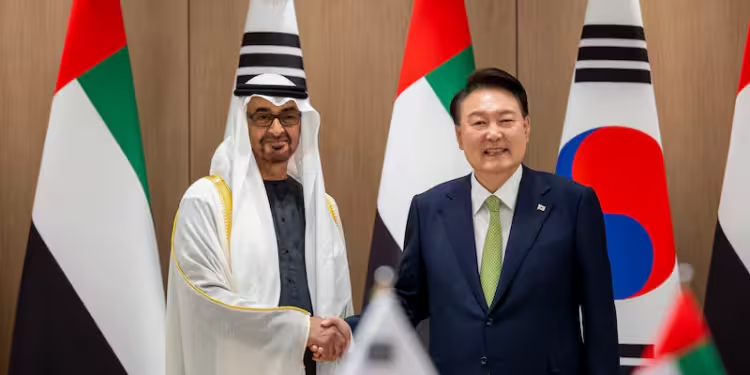South Korea and the United Arab Emirates (UAE) have signed a significant trade agreement aimed at drastically reducing import duties and enhancing business and investment relations between the two nations. The agreement was formalized during a summit held on Wednesday, attended by UAE President Sheikh Mohamed bin Zayed Al Nahyan and South Korean President Yoon Suk Yeol.
The office of President Yoon Suk Yeol emphasized that the “special bond between the two leaders serves as an opportunity” to further advance the strategic partnership between South Korea and the UAE. This summit follows President Yoon’s state visit to Abu Dhabi last year and concentrated on key areas such as energy and defense, highlighting South Korea’s interest in leveraging the investment potential of the energy-abundant Gulf state.
During the summit, the UAE reaffirmed its commitment to invest $30 billion in South Korean businesses. This investment spans across various sectors, including nuclear power, defense, hydrogen, and solar energy. One notable agreement was a letter of intent signed by the Abu Dhabi National Oil Company for Hanwha Ocean and Samsung Heavy Industries to construct at least six LNG carriers valued at approximately $1.5 billion.
A major highlight of the summit was the signing of a Comprehensive Economic Partnership Agreement (CEPA) initially agreed upon in October. This agreement, once ratified, will eliminate all tariffs on South Korean arms exports to the UAE. South Korea, which has been expanding its global defense equipment contracts, aims to become the world’s fourth-largest defense exporter by 2027.
The CEPA also includes provisions for the UAE to gradually eliminate import duties on automobiles over the next decade. In return, South Korea will remove tariffs on crude oil imports from the UAE. The overall impact of the agreement is expected to eliminate tariffs on more than 90% of the imports between the two nations, significantly boosting trade and economic cooperation.
South Korea’s Minister of Trade, Cheong In-kyo, highlighted the importance of this agreement, noting that “South Korea’s crude oil imports from the UAE are expected to increase,” emphasizing the country’s reliance on energy imports. This trade deal is expected to play a crucial role in ensuring stable energy supplies for South Korea.
Additionally, the UAE’s Minister of Foreign Trade, Thani bin Ahmed Al Zeyoudi, mentioned that the UAE plans to sign similar CEPAs with Malaysia, Vietnam, and the Philippines in the coming months, further extending its trade network in Asia.
On the defense front, while no new arms deals were announced during the summit, both nations expressed their intent to enhance cooperation between their defense industries. The UAE’s investment pledge includes a focus on developing advanced defense technologies, aligning with South Korea’s strategic goals in the defense sector.
During his visit, Sheikh Mohamed bin Zayed Al Nahyan also met with leaders of some of South Korea’s top conglomerates, including Jay Y. Lee of Samsung Electronics, SK Group Chairman Chey Tae-won, and Kim Dong-kwan of Hanwha Group, which has emerged as a major defense contractor. These meetings underscored the commitment of both nations to foster stronger business ties and collaborative ventures.
The trade agreement and the reaffirmation of the UAE’s investment pledge signify a deepening of economic and strategic ties between South Korea and the UAE. This partnership is expected to bring about substantial economic benefits, including increased trade volumes, enhanced energy security for South Korea, and a robust framework for industrial cooperation.
Furthermore, the elimination of tariffs on a vast majority of imports will likely lead to a more competitive market environment, benefiting consumers and businesses in both countries. The focus on sectors such as renewable energy, defense, and advanced technologies aligns with global trends towards sustainability and innovation, positioning both nations as key players in these areas.
The trade agreement between South Korea and the UAE marks a significant milestone in their bilateral relations, paving the way for enhanced economic cooperation and strategic partnership. As both nations continue to explore new avenues for collaboration, this agreement is expected to have a lasting positive impact on their economies and contribute to the stability and growth of their respective industries.
















